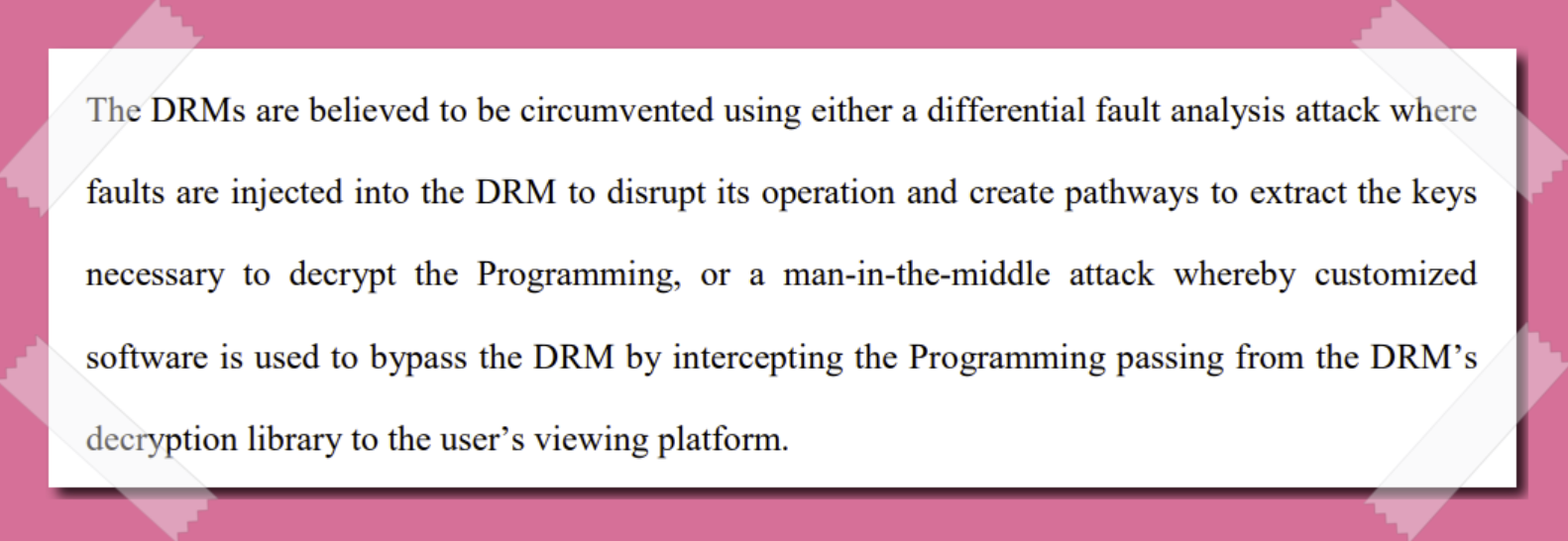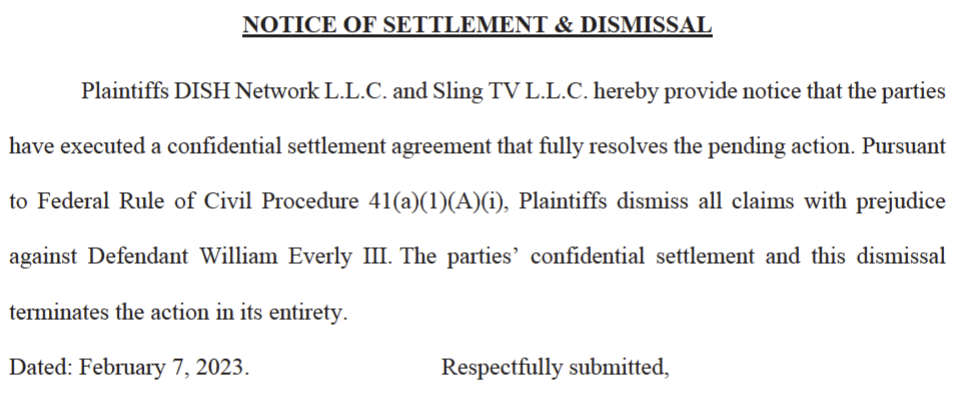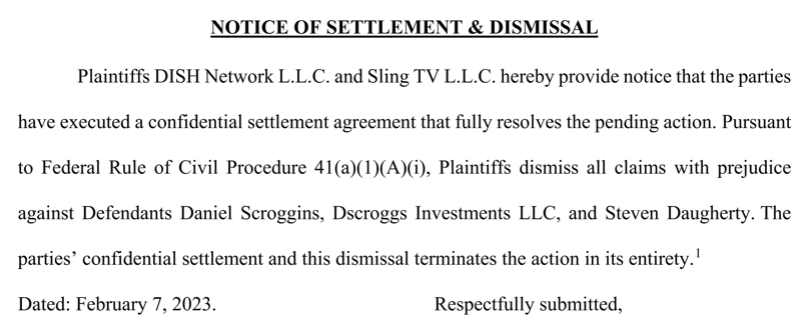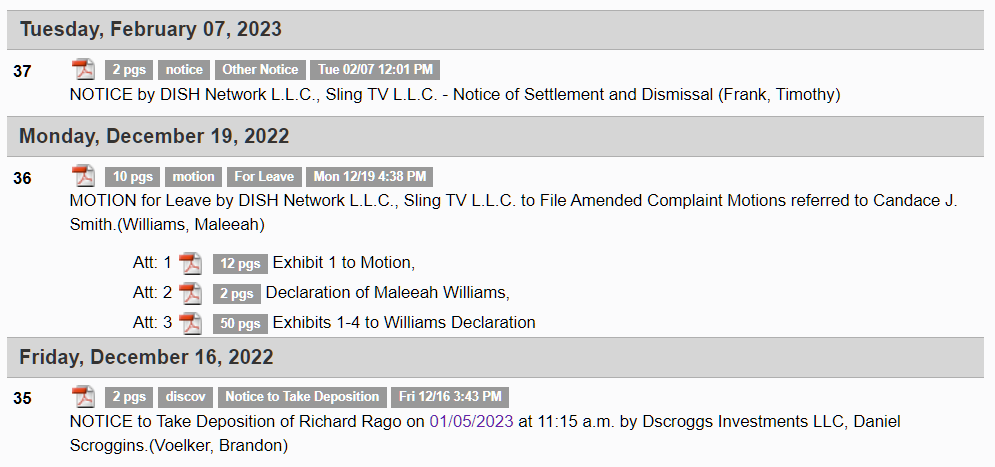In May 2018, a massive copyright infringement lawsuit targeted PrimeStreams, one of the most recognizable pirate IPTV brands ever to hit the market.
Filed in a Kentucky court, the complaint saw U.S. broadcaster DISH Network and streaming platform Sling TV target alleged PrimeStreams operators Daniel Scroggins and Steven Daugherty, plus corporate entity Dscroggs Investments LLC.
Two Copyright Infringement Lawsuits
The foundations of the complaint were straightforward. After bypassing or disabling security measures (DRM) deployed by Sling to prevent piracy, the defendants allegedly accessed and then redistributed streams in violation of the DMCA’s anti-circumvention provision and the Federal Communications Act.
The complaint further alleged that resellers, including the well-known ‘Firesticksteve’, helped to ensure a steady flow of customers to PrimeStreams. In October 2022, DISH filed a second lawsuit against IPTV service KTV Streams.
The complaint alleged that after PrimeStreams had circumvented Sling’s DRM, KTV resold the resulting streams to its own customers. In common with the main lawsuit, evidence appeared to be piled sky-high.
In both cases, damages were set to run into tens of millions of dollars, and DISH was explicit that permanent injunctions were required to prevent further infringement.
KTV Case Quietly Dismissed
On Tuesday this week, seemingly out of nowhere, DISH dismissed its lawsuit against the alleged operator of KTV Streams. Citing a confidential settlement agreement between the parties, the lawsuit was dismissed with prejudice, meaning that it cannot be refiled.
Settling a legal dispute with an agreement can make perfect sense. Costs can build up extremely quickly and may take some defendants by surprise. If defendants happen to have something the plaintiffs want – information, for example – that could encourage a meeting of minds and a mutually beneficial end to hostilities.
When the plaintiffs are in the driving seat in piracy cases, settlement agreements are often used as publicity tools. While the specifics are nearly always confidential, a headline-grabbing settlement amount, usually in the millions of dollars, is useful for deterrent messaging: We settled this case, but look how painful it was for the defendants, the underlying tone tends to suggest.
This can even be the case when the terms of a private agreement dictate that, effectively, nothing will get paid. What plaintiffs nearly always want, however, is a legal agreement that infringers won’t simply start up again. For that reason, plaintiffs usually request an injunction, because having come this far, why wouldn’t they?
In the KTV case there has been no announcement and no formal injunction. There may well have been a private agreement not to infringe in future, but that’s not usually how these cases go. (pdf).
PrimeStreams Lawsuit Also Dismissed
A few hours after a settlement was announced in the KTV case, the lawsuit against PrimeStreams was also dismissed. The circumstances as presented on the docket, are more or less identical. The notice of settlement and dismissal cites a confidential settlement agreement that “fully resolves the pending action” against all defendants.
Given the prominent status of PrimeStreams in the market, the scale of the evidence presented by the plaintiffs thus far, the absence of a court-issued injunction, and a dismissal with prejudice (lawsuit cannot be refiled), this stands out as a rather lackluster ending in place of what could’ve been a spectacular finale. When combined, the overall impression suggests that something may have gone wrong.
Both Dockets May Offer Clues
When lawsuits end like this, obtaining definitive proof of the circumstances ranges from difficult to all but impossible. Analyzing information already made available to the public is often all that remains, but that can still offer some interesting angles.
On November 11, 2022, Steve Daugherty (aka Firesticksteve) filed a motion to dismiss. In a nutshell, the complaint alleged he was co-owner of PrimeStreams and that he conducted business in Kentucky where the lawsuit was filed.
In a sworn affidavit, Daugherty denied both allegations. On December 9, 2022, DISH filed its response indicating that its position had not unchanged. The court should deny the motion, the company said (pdf).
A declaration submitted by private investigator Bert Eichhorn, in his capacity as Director of Field Security and Investigations at NagraStar, reveals many intimate details of PrimeStreams’ operations, including two financial transactions of $471,972 and $780,989, and another in excess of $320,000.
These are interesting details but unhelpful in determining why the lawsuits were dismissed. If anything, they only serve to deepen the mystery.
Motion to File Amended Complaint
After concluding that it had enough evidence, on December 19, 2022, DISH informed the court that it intended to add new defendants (Brian Poynter and his company Brian P. Ventures LLC) in its upcoming first amended complaint. While that’s certainly notable, something else catches the eye.
In the original complaint, DISH claimed that PrimeStreams bypassed or disabled security measures deployed on the Sling streaming service to gain access to copyright-protected content. The defendants illegally accessed streams and redistributed them to the public in violation of the DMCA’s anti-circumvention provision.
These fundamental claims, apparently supported by ample evidence, suddenly became so irrelevant that they should be completely removed from the complaint.
No Longer Pursuing Allegations of Direct Circumvention
“In the proposed amended complaint, Plaintiffs withdraw their circumvention claim brought under 17 U.S.C. 1201 (a)(l) of the DMCA. Evidence received to date supports that claim, including Scroggins having asserted the Fifth Amendment privilege against self-incrimination when asked to explain how television channels are acquired and transmitted on the PrimeStreams service,” the plaintiffs’ motion reads.
“However, litigating this claim would be unnecessary given Plaintiffs’ additional DMCA claim and FCA claims that also prohibit Defendants’ wrongful conduct and provide for comparable, if not greater, relief.”
Rather than pursuing its original claim under 17 U.S. Code § 1201 (a)(l), which relates to direct circumvention of Sling’s technological measures, DISH said it would rely on 17 U.S. Code § 1201 (a)(2). This relates to the manufacture or supply of technology primarily designed for the purpose of circumventing a technological measure.
In this case, that means selling pirate IPTV subscriptions. It’s still illegal, of course, but having claimed that the defendants actually circumvented Sling’s content protection systems, including in a declaration filed just days earlier, this late switch seems somewhat unusual.
Events Leading Up to KTV Lawsuit Dismissal
On January 4, 2023, a month before the entire action was dismissed, the defendant in the KTV lawsuit asked the court for more time to answer the DISH complaint. The motion notes that the claims in his case are “closely tied” to the claims in the PrimeStreams case, and then this:
“More specifically, the deposition of a key witness in this dispute, Richard Rago, is scheduled to take place in the Kentucky litigation tomorrow, January 5, 2023. Mr. Rago’s testimony likely will have a significant impact on Plaintiffs’ claims and Defendant’s defenses and/or counterclaims, as well as the potential resolution of this matter as a whole.”
So who is Richard Rago and more importantly, why was his testimony so important? Publicly available information suggests that Mr. Rago may have previously acted as an advisor/negotiator on issues related to debt in piracy cases. The MPA mentioned their legal team having contact with a person of the same name back in 2019, in a separate lawsuit against another IPTV service, SetTV.
SetTV had previously been sued by DISH, with the warring parties eventually entering into an agreement that would see DISH walk away with a $90 million damages award and a permanent injunction.
What happened during Mr. Rago’s deposition or why he even became involved in the PrimeStreams cases is unknown. Nothing specific appeared on the docket, and since the lawsuit has been completely dismissed and can’t be filed again, further information seems unlikely to surface in public.
All we can say for sure is that for some reason, DISH sought permission to withdraw its lead circumvention claim on December 19, 2022, but never actually amended its complaint. The deposition was scheduled for January 5, 2023, and nothing appeared on the docket until both cases were dismissed on February 7, 2023, (pdf).
In today’s climate, lawsuits supported by considerable evidence, against accessible defendants, rarely end in a settlement without a headline dollar amount and a permanent injunction. To be dismissed with prejudice without either simply puts a cherry on top.
It’s hard to imagine what type of event could lead to this kind of outcome, but whatever it was, it seems to have solved all problems, in two lawsuits, in one swoop. The fact that the lawsuits can’t be refiled is nothing less than extraordinary.









